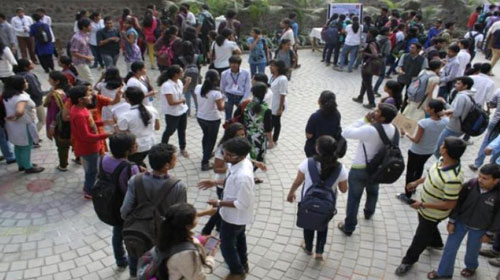Students and academics have criticised the Narendra Modi government’s decision to discontinue the Maulana Azad National Fellowship, calling the move “anti-minority”.
Union minority affairs minister Smriti Irani on December 8 told the Lok Sabha that MANF was overlapping with other schemes under which minority students are also covered.
MANF is a fellowship for economically weaker students from minority communities. It covered all institutions recognised by the University Grants Commission (UGC).
Students from six notified minority communities – Muslim, Buddhist, Christian, Jain, Parsi and Sikh – received financial help from the scheme for higher education in MPhil and PhD programmes.
The United Progressive Alliance government, led by Manmohan Singh, had launched the MANF in an effort to implement the 2006 recommendations of the Sachar Committee. It’s named after India’s first education minister, Maulana Abul Kalam “Azad”.
Students and academics say that the decision to withdraw the MANF is part of the BJP regime’s “anti-minority” playbook. Calling it an “unfair” decision, they say it shows the Modi government’s disregard for freedom fighters.
Maulana Azad’s family also criticised the move, saying it clearly shows the government’s intent to make the freedom fighter’s contribution to the country inconsequential.
Experts noted that the move would make higher education inaccessible to underprivileged students from minority communities.
Sukhadeo Thorat, former chairman of the UGC, pointed out, “Muslims have the lowest gross enrolment ratio (GER), at 16%, in higher education [institutions] among all the communities in the country as compared to the national average of 26.3%.”
“If fellowships are taken away from the minority communities, they won’t be able to go to universities or any other higher education institutions,” he added.
Historian Irfan Habib said, “This is not an insult to Maulana Azad alone but also disregards all the freedom fighters together.”
“It is awful that the government withdrew the fellowship that was named after Maulana Azad, who was the longest-serving education minister of India and under whose regime several premier educational institutions, including the Indian Institute of Technology (Kharagpur), and academies, including the Sangeet Natak Akademi, came into existence,” he said.
In her speech, Irani had said that the scheme was being discontinued because it “overlaps with other scholarships”.
Professor Suraj Bahadur Thapa of Lucknow University said that “unfortunately, instead of correcting the anomalies, they stopped the scholarship altogether.” He further asked why the government does not register students to apply for a fellowship with their Aadhaar number, to avoid issues of overlapping.
Nandita Narain, former president of the Delhi University Teachers’ Association, said that the government is with-drawing the MANF at a time when the minority communities need it most. It reflects the “anti-education” and “anti-Muslim” mindset of the ruling dispensation, she said.
Husnara Salim, the grand-niece of Maulana Azad, said this government has been persistently trying to diminish Azad’s personality since it came into power in 2014.
She was told that last year, at a programme of the Indian Council for Cultural Relations, a statue of Maulana Azad was removed, and his books, donated by his family, were lying in the dust. Azad was a founding member of the council.
She said that every citizen must raise their voice to restore the MANF that was shaping the future of students be-longing to economically weaker sections.—Agencies










